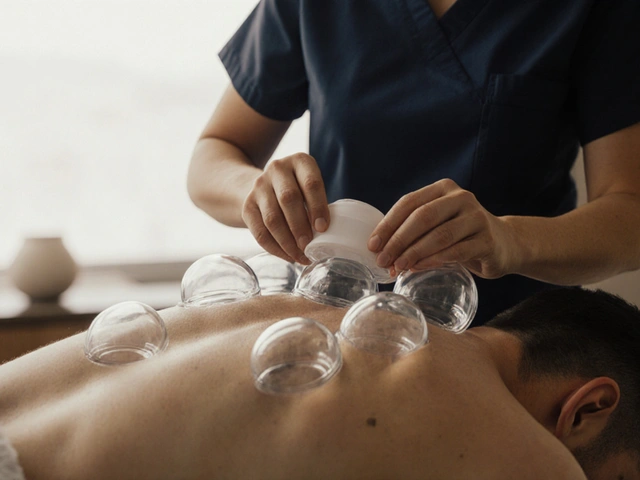Top Benefits of Choosing Medical Massage Therapy

Medical massage goes beyond mere relaxation. It's a therapy designed to address specific health issues and improve the quality of your life. Whether you are dealing with chronic pain, recovering from an injury, or looking to enhance your mental well-being, medical massage can offer tangible benefits.
This article explores the top reasons why incorporating medical massage into your health routine might be one of the best decisions you make. Let's delve into how this specialized form of massage can aid in different aspects of health and well-being.
Pain Relief
Many people seek out medical massage primarily for pain relief. It's not just about feeling relaxed; it’s a therapeutic approach designed to target and alleviate chronic and acute pain points within the body. Whether you suffer from back pain, migraines, or arthritis, medical massage can provide significant relief, helping you achieve a higher quality of life.
Unlike traditional massage, which often focuses on general relaxation, medical massage is tailored to treat specific areas of pain, effectively addressing the underlying issues causing discomfort. Therapists are trained to understand muscular-skeletal conditions and manipulate tissues in ways that reduce pain, increase mobility, and promote healing. Studies indicate that regular sessions can minimize the need for pain medication, offering a natural alternative for managing soreness and stiffness.
One of the key benefits is its ability to alleviate pain through increased blood circulation. Enhanced circulation can reduce inflammation and oxygenate muscles, leading to faster recovery and pain relief. A study conducted by the American Massage Therapy Association found that people living with chronic pain experienced a 36% reduction in pain after just a few weeks of medical massage therapy.
“Massage therapy can be a powerful tool in your pain management arsenal. It offers a holistic solution that not only addresses the symptoms but also aids in long-term healing.” – Dr. Mark Hyman, Functional Medicine Expert
The personalized nature of medical massage means that therapists can adjust their techniques to suit your unique needs, whether that involves deep tissue work for muscle pain or gentle, targeted pressure for joint pain. This adaptability is crucial because everyone’s experience of pain is different, necessitating a customized plan for effective relief.
Trigger point therapy is another method used within medical massage to relieve pain. By applying pressure to 'trigger points'—knots in the muscles that can refer pain to other parts of the body—therapists can help reduce pain and increase range of motion. Many patients report immediate relief after just one session, making it a highly effective short-term solution that also benefits long-term health.
People suffering from tension headaches or migraines also find relief through this specialized form of massage. Techniques focused on the neck, shoulders, and head can reduce muscle tension that often leads to headaches. By maintaining regular sessions, many people find a noticeable decrease in the frequency and severity of their headaches.
Studies have consistently shown that medical massage can be particularly effective for conditions like fibromyalgia and sciatica. For fibromyalgia sufferers, this type of massage helps in reducing the muscle pain and tender points associated with the condition. For those dealing with sciatica, targeted techniques can alleviate nerve compression and relieve the resultant leg pain.
Massage and Chronic Pain Management
For chronic pain, a multi-faceted approach is often necessary, and medical massage can play a critical role in this strategy. Integrating regular massage sessions can complement other treatments like physical therapy or chiropractic adjustments, enhancing their effectiveness. Chronic conditions like lower back pain, often exacerbated by bad posture or repetitive movements, see great improvements with an integrated approach that includes medical massage.
In conclusion, medical massage is a powerful tool for pain management. Whether you're dealing with chronic conditions, recovering from an injury, or simply looking to alleviate everyday aches and pains, this therapy offers a drug-free, low-risk option with proven efficacy. It’s not just about feeling good in the moment but setting the stage for long-term wellness and pain relief.

Injury Rehabilitation
When it comes to recovering from injuries, medical massage can play a critical role in your rehabilitation process. This type of therapy is not just about treating the symptoms but addressing the root causes of the pain and discomfort. Many people find that regular sessions with a trained massage therapist can significantly speed up their healing process. Whether you're dealing with a sports injury, a car accident, or a work-related incident, medical massage offers targeted relief and helps in restoring mobility.
One of the greatest benefits of this therapy is its ability to improve circulation. Enhanced blood flow means more oxygen and nutrients are delivered to the injured area, which promotes faster healing. Additionally, good circulation helps in reducing inflammation and swelling, which are common after an injury. It's important to note that medical massage isn't just a one-time fix. A consistent schedule can make a dramatic difference in how quickly and effectively your body recovers.
Medical massage also helps in breaking down scar tissue. Scar tissue forms as your body repairs itself after an injury, but too much of it can restrict movement and cause pain. Skilled massage therapists use specific techniques to soften and release this scar tissue, improving flexibility and reducing discomfort. This is particularly beneficial for athletes who need to regain full range of motion to return to their sport.
According to a study published in the Journal of Physical Therapy Science, patients who received medical massage therapy reported better outcomes in pain reduction and mobility compared to those who received other forms of treatment.
"Massage therapy can significantly expedite the rehabilitation process and improve the overall quality of life for individuals recovering from injuries," says Dr. Jane Thompson, a leading expert in physical therapy.
Moreover, massage therapy can be tailored to your specific needs. Different injuries require different approaches. For instance, a rotator cuff injury may need gentle muscle manipulation, while a torn ligament might benefit more from deep tissue work. Your therapist will evaluate your condition and customize the treatment plan accordingly.
Finally, medical massage provides another invaluable benefit: mental well-being. Dealing with an injury can be incredibly stressful, affecting your mood and overall outlook on life. The soothing nature of massage therapy helps in reducing stress and anxiety levels, making the recovery process more bearable. You'll find yourself not only physically improving but also feeling a greater sense of relaxation and mental clarity.
Incorporating medical massage into your injury rehabilitation plan can provide a multifaceted approach to healing. It addresses physical pain, promotes quicker recovery, and supports mental health, making it an all-encompassing solution that shouldn't be overlooked. So, if you’re on the path to recovery, consider adding medical massage to your treatment regimen for a more holistic approach to healing.

Mental Health Benefits
Medical massage isn't only a physical treatment; it's a holistic approach that significantly influences your mental health too. Imagine the incredible relief of stress melting away from your body. That's how medical massage feels. The process can reduce the levels of cortisol, the stress hormone, in your body. This is especially crucial for people living busy, high-pressure lives. With each session, you can achieve a clearer, calmer mind.
One of the most remarkable effects of medical massage is its ability to foster the production of feel-good hormones such as serotonin and dopamine. These hormones are key to maintaining a positive mood and reducing anxiety. Many people who regularly receive medical massages report lower levels of depression and an overall sense of well-being. An interesting fact – regular massage sessions can potentially enhance your sleep quality, allowing you to wake up refreshed and more focused.
According to a study from the Touch Research Institute, “Massage therapy decreases the stress hormone cortisol, and increases serotonin and dopamine, neurotransmitters that help reduce depression.”
Another noteworthy benefit is the way medical massage aids in the management of psychological conditions like PTSD and anxiety disorders. For instance, those suffering from PTSD may find relief from intrusive memories and heightened arousal due to the calming effects massages bring. The consistent application of therapeutic touch can remarkably ease mental distress, establishing a tranquil and secure state of mind.
When we talk about emotional balance, medical massage plays a crucial role in supporting your mental health. Life events that cause grief, anger, or overwhelm can be soothed through the comforting rhythm of massage. This technique assists in releasing emotional baggage stored in the muscles, aiding in maintaining a healthier mental state. One could consider it a dependable ally during emotionally turbulent times, providing much-needed solace and stability.
If you ever feel burnt out or mentally exhausted, medical massage can be a solution. It doesn't just work on the body but also alleviates mental fatigue. This holistic approach revitalizes your energies, making you feel rejuvenated. Repeated sessions can set off a cycle of well-being where your mind and body continuously benefit from each other. Ultimately, it creates a more harmonious and stress-free lifestyle, significantly enhancing your quality of life.

Lifestyle Integration
Integrating medical massage into your daily routine can be seamless and highly beneficial. Many people assume massage therapy is only for occasional indulgence or recovery moments, but making it a regular part of your lifestyle can elevate your overall well-being. First, it's important to schedule your sessions consistently. Weekly or bi-weekly appointments can make a noticeable difference in how you feel and function.
Think about creating a dedicated time slot for your medical massage sessions. If mornings energize you or if evenings help you unwind, pick a time that aligns with your body’s natural rhythms. Consistency can help your body adjust and optimize the benefits of each session. Over time, you might notice improvements in your muscle flexibility, joint mobility, and even your sleep patterns.
Moreover, establishing a relationship with a therapist who understands your specific needs can be particularly valuable. Communication is key; make sure you discuss your health goals and any ongoing issues you might be experiencing. This personal connection ensures that your therapist can tailor each session to suit your changing needs. This personalized approach contributes significantly to the effectiveness of the therapy.
It's also useful to incorporate additional healthy habits alongside your massage routine. Simple stretches before and after sessions can enhance the therapeutic effects. Focus on staying hydrated, as water helps in flushing out the toxins released during the massage. Consider pairing your medical massage with other wellness practices like yoga or meditation as well. Combining these can create a holistic approach to your health.
On a practical level, factoring in the cost of regular sessions into your budget allows you to view massage therapy as an investment in your health, rather than an unnecessary expense. Many health insurance plans also cover medical massage when prescribed by a physician, so it's worth checking your policy details. This can make regular sessions more affordable and sustainable over time.
Additionally, keeping a massage journal can be incredibly insightful. Jot down how you feel before and after each session, noting any specific areas of pain or improvement. This record can help you track your progress and spot any patterns that emerge, giving you and your therapist valuable information for future sessions.
"Massage therapy, when performed regularly, can significantly improve quality of life by reducing pain, improving mood, and enhancing overall functionality," says Dr. Vincent Khy, a renowned physical therapist and wellness expert.
By viewing medical massage as a vital part of your health care regimen, similar to exercise and a balanced diet, you enhance your body’s natural ability to maintain balance. This can lead to fewer medical interventions in the long run. The ongoing care you invest in through regular sessions empowers you to take control of your health proactively.
Effective lifestyle integration of medical massage isn't just about the physical benefits; it’s also about mental and emotional wellness. Stress management is one of the key components. Regular massage can lower cortisol levels, the stress hormone, promoting a sense of calm and relaxation. This mental clarity can enhance productivity and improve your quality of life, both at work and at home.





